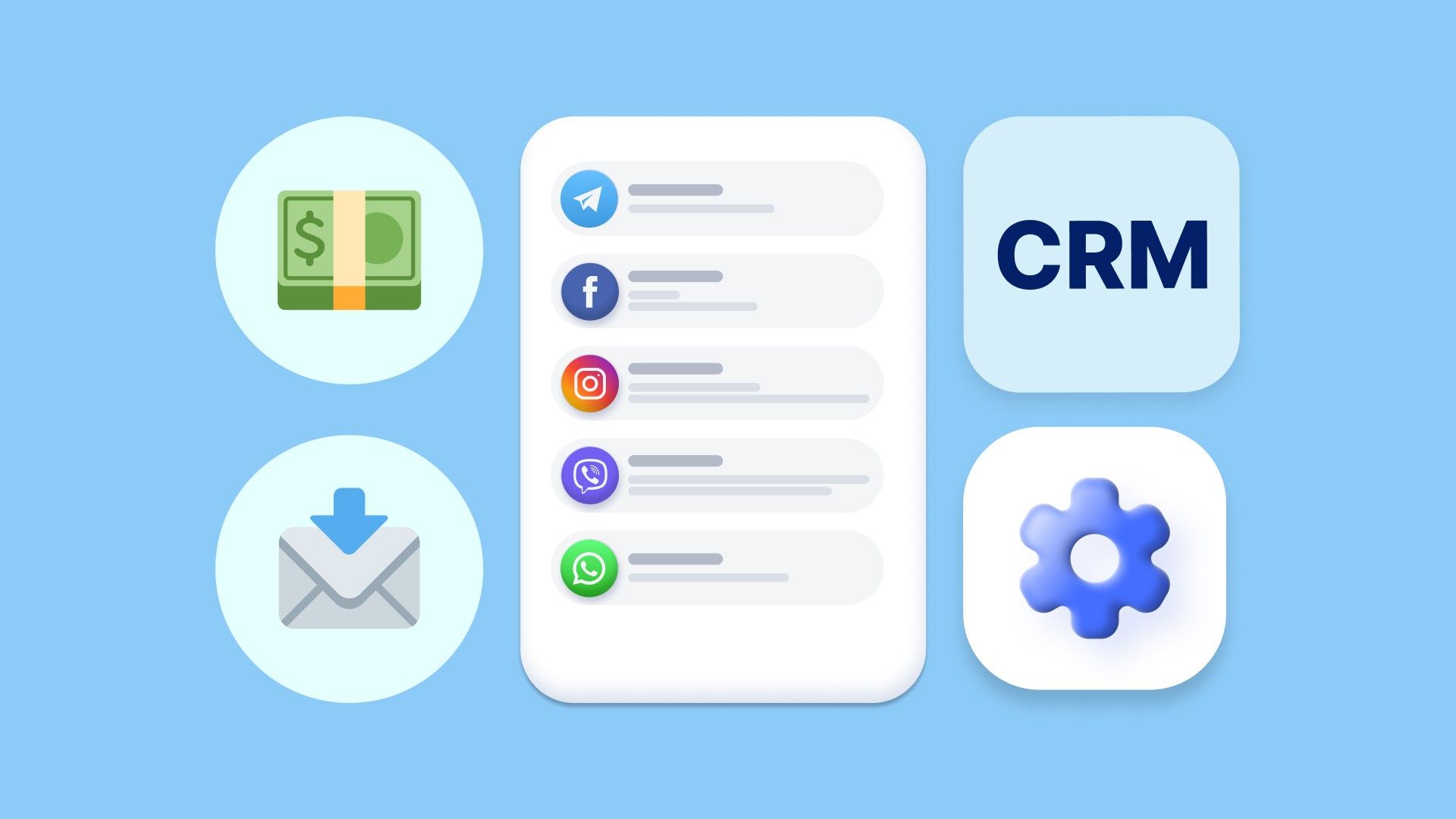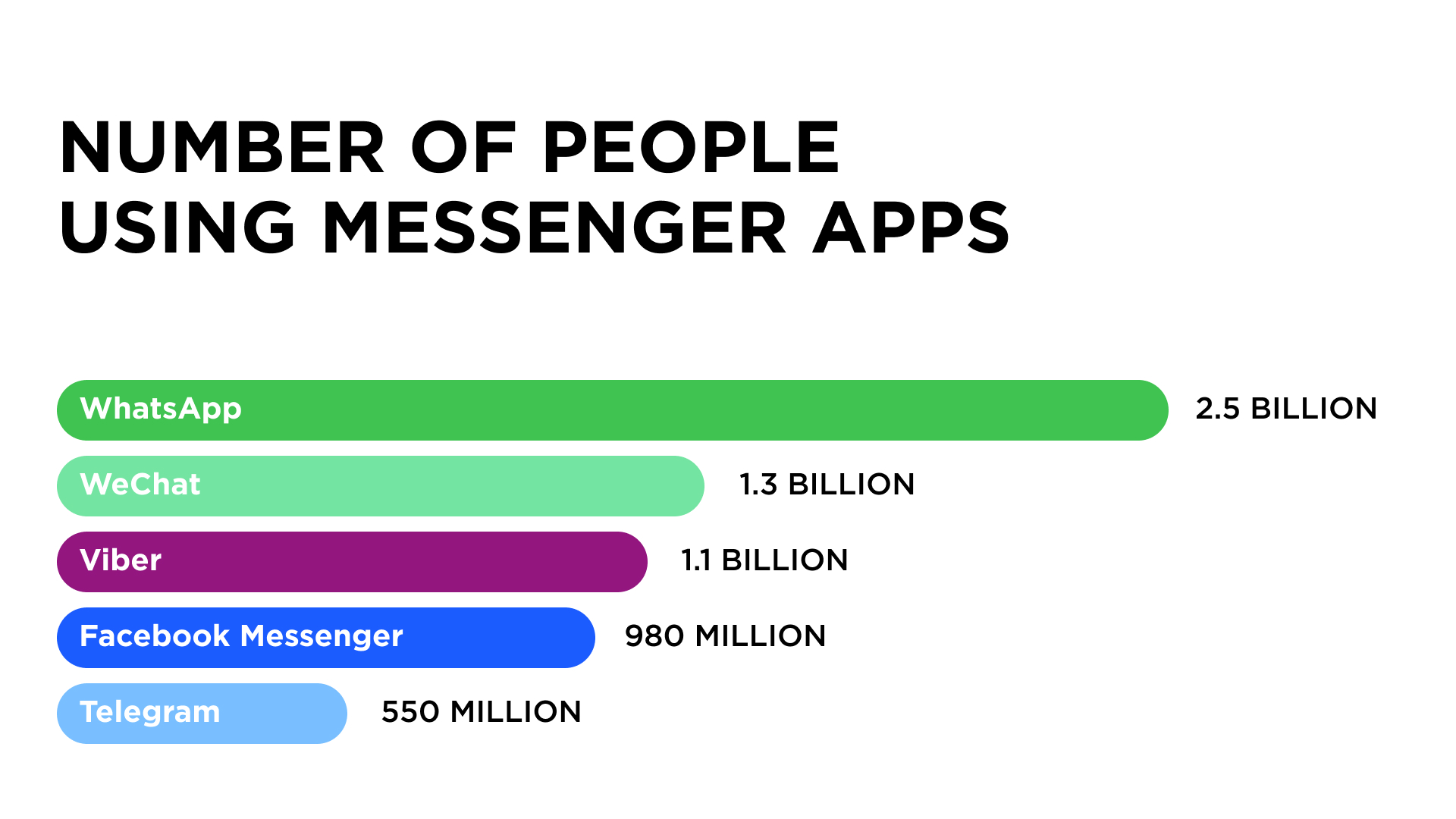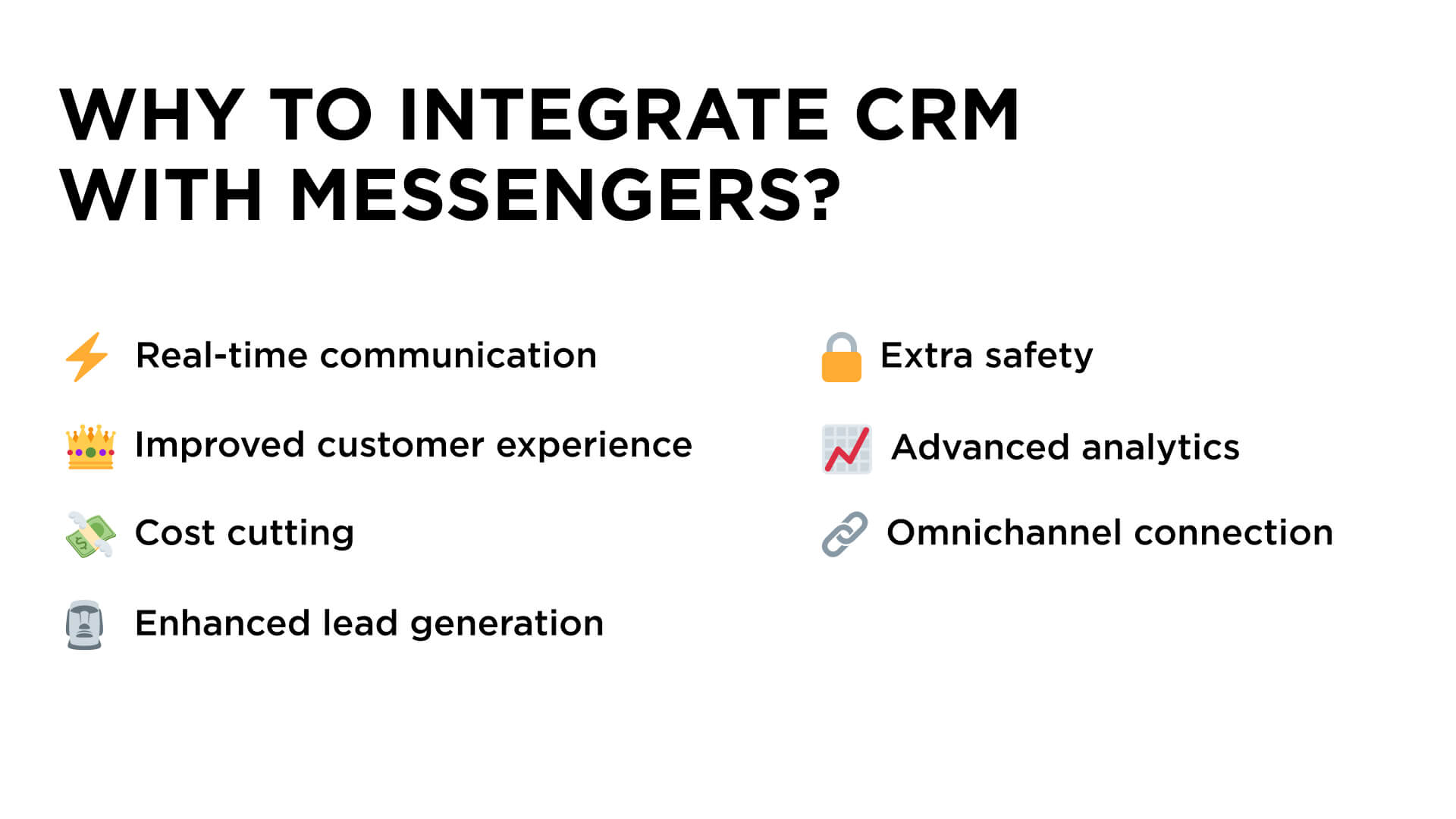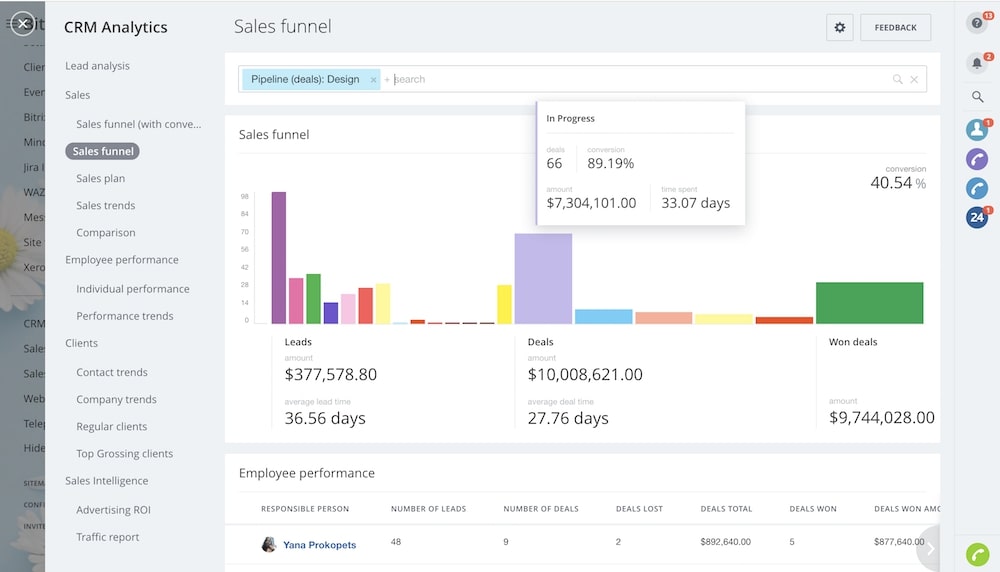7 Advantages of Integrating CRM with Messengers
Discover how integrating CRM system with messengers can improve sales, employees efficiency and customer satisfaction.

Today, CRM integration with messengers has become an essential tool for any business that looks to maintain active relations with its client and beat the competition. The number of messaging apps’ users has already surpassed 3 billion globally, according to Statista. Such a figure clearly shows that neglecting messengers as a communication channel is not an option for businesses of any size or industry. The era of messenger-based sales is upon us, and establishing personalized connections with clients through their preferred messenger apps has gradually become a key ingredient of long-term success.
Using messengers in marketing activities and customer support can greatly improve brand awareness, conversions, and customer satisfaction. However, the multitude of messaging channels significantly increases the workload of sales reps and support agents, who have to track customer requests in a dozen chats and maintain unified cards of them all in CRM (customer relationship management) systems. The solution here is integrating the company's CRM system with messengers to automate the majority of agents’ routine work and let them engage with all customers through a single interface. In the article, we’ll go over why customers love messengers so much, the main benefits of CRM with messenger integrations, and how to pick the right solution for your business.
Table of contents
How CRM and messengers integration works
CRM integration with messengers creates a unified customer communication hub, centralizing interactions from various platforms, enriching customer profiles, streamlining support, and enabling personalized engagement with clients.
Why customers prefer communicating through messengers
According to BusinessInsider’s surveys, more than half of customers are more likely to shop with a business, which can be reached via messengers. Why people are so into messaging apps these days and why this affinity goes beyond contacting persons they know in real life can be explained by several factors.
Popularity
As mentioned before, almost every third person in the world uses messengers for daily communication with their relatives, colleagues, as well as following brands, opinion makers and learning the latest news. Among the most popular messaging apps are WhatsApp, WeChat, Facebook Messenger, and Viber.

Diversity
Over the past decade, messengers have evolved from internet-based SMS substitutes to apps with extensive functionality, which far exceeds text-based communication. All major messengers support one-on-one and group audio and video calls, file sharing, as well as group chats, channels, and location-based communities. All of this makes messaging apps suitable for not only staying in touch with users' phone contacts but also for meeting new people, connecting with companies, reading news, and consuming various content. This in turn greatly increases the amount of time spent daily on messengers.
Privacy
Facing tough competition, every messenger app aims to outperform the competition by various means. Since secure communication and privacy protection are in strong demand in today’s global society, messengers make big efforts to protect users’ data. End-to-end encryption, two-factor authentication, disappearing messages — all these functions come freely available in messengers to increase users’ trust and attract more clients.
Personalization
Messenger apps provide many tools to personalize customer experience. From tweaking notifications for every individual chat, adjusting privacy settings (who can see the last time a user has been online or their profile picture), archiving and grouping various chats and channels, to changing interface color, text size, and so on. All of this makes messengers so convenient to so many people.
Affordability
Delivering messages and files via the internet, most messengers are completely free to use. There are no extra fees for making calls to users across the globe or sending multiple messages to multiple contacts. At the same time, some apps, such as Telegram, offer premium paid functionality for those who want some advanced functionality.
Main reasons to integrate CRM with messengers
CRM systems are popular tools widely adopted by small to large-sized companies. They help track interactions with potential customers, as well as build a stronger bond with existing clients by learning their preferences. CRM implementation optimizes the work process of sales reps, streamlining lead management and helping close more sales faster.
However, current CRM systems lack the solutions necessary for instant messaging via multiple channels, which are the main characteristics of messenger communication. As a result, employees have to interact with clients within several interfaces simultaneously and manually input client or deal details in a CRM system. The solution to this problem is integrating CRM with messenger apps to streamline and unify all communication.

1. Real-time communication & feedback
Communication in messengers happens in real time, at a much faster pace compared to email and in a more convenient form compared to phone calls. Integrating messengers with a CRM system allows agents to process customer requests and connect with clients instantly while leveraging the benefits of customer relationship management tools, such as sales funnel, contact history, sales goal setting, and forecasting. Integration with CRM makes communication via messengers much more convenient for employees while remaining as instant as when chatting directly in messenger. This allows sales or support agents to focus on a client’s issue and provide timely response to their inquiry, which leads to improved conversion and satisfaction rates among customers.
Also, any issue with a product or service can be instantly communicated via messengers and promptly handled by a qualified support agent, thanks to request categorization and routing. This makes CRM and messengers integration beneficial for feedback processing and issue resolution time.
2. Personalized customer experience
A CRM system stores detailed personal data on every customer: their purchase history, buying preferences, contact details, and previous issues. Accessing this data while communicating with a client via messenger integration makes it easier to personalize their experience. For example, if a customer buying a pair of shoes requests style advice, a shopping assistant can quickly provide suitable options available from brands and in sizes they previously ordered, decreasing the number of clarifying questions and improving the customer’s shopping experience.
Also, customer details accumulated by the CRM system are useful for marketing campaign personalization. Demographics, location, shopping patterns — all of these help to define specific audience segments and send them tailored special promotions and discounts via their preferred messaging channels.
3. Cost reduction
Thanks to CRM integration, streamlined and partially automated communication via messengers allows existing teams to work more effectively, process more leads and support tickets in less time. All of this means that a business can optimize its resources and increase conversion and sales without increasing the number of employees or traffic volume by simply using CRM integrations with messengers.
4. Improved lead generation
Since CRM integration allows automation of operations, such as the creation and filling of a lead card, employees can worry less about routine tasks and focus on better engagement with potential clients and conversion increase. For example, Umnico’s ready-to-use CRM integrations with amoCRM, Bitrix24, MySupply, MyDocuments-Tourism, and Vtiger systems allow sales reps to streamline their lead processing and interact with clients across multiple channels in a single widget.
5. Security
If a sales rep communicates with clients via their personal accounts in messenger apps or keeps a client base in external systems, it increases the chances that they might take these clients with them when leaving a company. CRM and messengers integration decreases such security risks, as well as unauthorized access to clients’ details. The majority of CRM systems utilize two-factor authentication, multiple access levels, and logging of every user action, which gives more control over who can view the details of a customer and interact with them.
6. Extensive analytics
CRM systems come with extensive tools for analytics, helping to track sales performance, lead processing, and customer support quality. CRM + messenger integration allows taking advantage of CRM’s analytical capabilities and maintaining unified statistics across all communication channels. For example, integration makes it easy to monitor average response time, the number of simultaneous chats per user, the popularity of particular support requests, and keywords in conversations. All of this makes it easier for managers to optimize sales strategy, support guidelines, and marketing campaigns.

7. Omnichannel communication
Having a previous conversation with a shopping assistant via WhatsApp, a client might contact support again via Viber support channel on a matter related to their previous inquiry. Without CRM integration, the support agent handling Viber requests would have to browse customer details in CRM and look up their previous WhatsApp chat, while maintaining the conversation in the messenger preferred by the client. Such a scenario is unlikely to deliver excellent customer support when there is a large volume of tickets. Messengers and CRM integration effectively solve this issue by keeping all previous conversations in multiple channels merged in a single chat. This way, an agent can quickly learn details from a previous request and provide personalized support.
How to choose CRM with messengers integration
Now that we’ve discussed the benefits of integrating CRM with messengers, it’s time to talk about the most important aspects to consider when choosing an integration solution for your business.
Number of channels
Picking an integration solution, review what messengers the CRM integration supports. The general rule is that a larger number of supported messengers is better since it enables to reach all potential customers via their preferred messenger apps. But of course, every integration costs money to develop and affects the final price of the product. Taking this into consideration, we recommend choosing a solution that provides CRM and messenger integration with 4 – 6 most popular apps among your target audience and countries of operation. This way, you will ensure that 9 out of 10 messenger inquiries can be processed within your CRM system.
Official and unofficial integration
Usually, when setting up CRM integration with messengers, there are two ways to go about it: official or unofficial solution. Many companies provide non-licensed integration APIs with such messengers as WhatsApp or Facebook Messenger. The main advantages of them are low cost (since all outbound messages are free, as for private users), and quick implementation, taking only hours or a day. However, since such solutions don't officially support bulk messaging, an account that sends more than 200 messages daily (in the case of WhatsApp Web) can be suspended. Thus, unofficial integrations are suitable for businesses with small audiences and budgets, whereas an enterprise should consider a professional solution.
The official WhatsApp Business integration is made with large entities in mind. Using such integration won’t result in a ban if a single corporate account messages hundreds of users at once. However, official solutions are pricier, charging a fee for every outbound message, and require business validation procedures that may take several days or weeks. Whether your company is a small one and wants to ensure there will be no account suspensions or you have a business with large sales and support departments, the official solution is the preferred one in both cases.
Umnico Inbox provides official pre-built integrations with the most popular messengers and several CRM systems to set up an all-in-one business messenger and omnichannel platform within your CRM. Any additional integrations are possible upon request.
Functionality
When choosing an integration provider, it is important to learn what set of functions each solution supports and how it correlates with the price of integration. For example, Umnico’s messengers + CRM integration supports extended messaging functionality, such as delivery status for messages and quotations. This makes conversations with a client via a CRM system as similar as possible to chats in messengers in terms of functionality, but far more convenient in terms of handling chats in several apps at once.
Also, for companies that don’t use CRM systems, Umnico has a cost-effective all-in-one messenger solution, which completely satisfies the essential communication needs of private business. The omnichannel messaging platform provides official integrations with the most popular instant messengers and CRM system functionality in an easy-to-use interface. This includes a chat widget that aggregates clients’ messages from various channels into a single conversation, a customizable pipeline with lead cards and sales stages, a task manager, and detailed analytics of average response time, sources of inquiries, and messaging costs.
Summing things up
The growing popularity of instant messengers makes them one of the most useful tools for business to reach customers and provide personalized real-time support. By merging dialogues from different channels into a single chat window and supplying comprehensible customer data, CRM integration with messengers, such as the one provided by Umnico, can help companies optimize the work of employees, improve customer satisfaction, and boost conversion. What’s equally important, all of these benefits do not require hiring new people, attracting additional traffic, or increasing support and sales departments’ budgets.

Subscribe to Umnico news!
Be the first to get recommendations and up-to-date information
